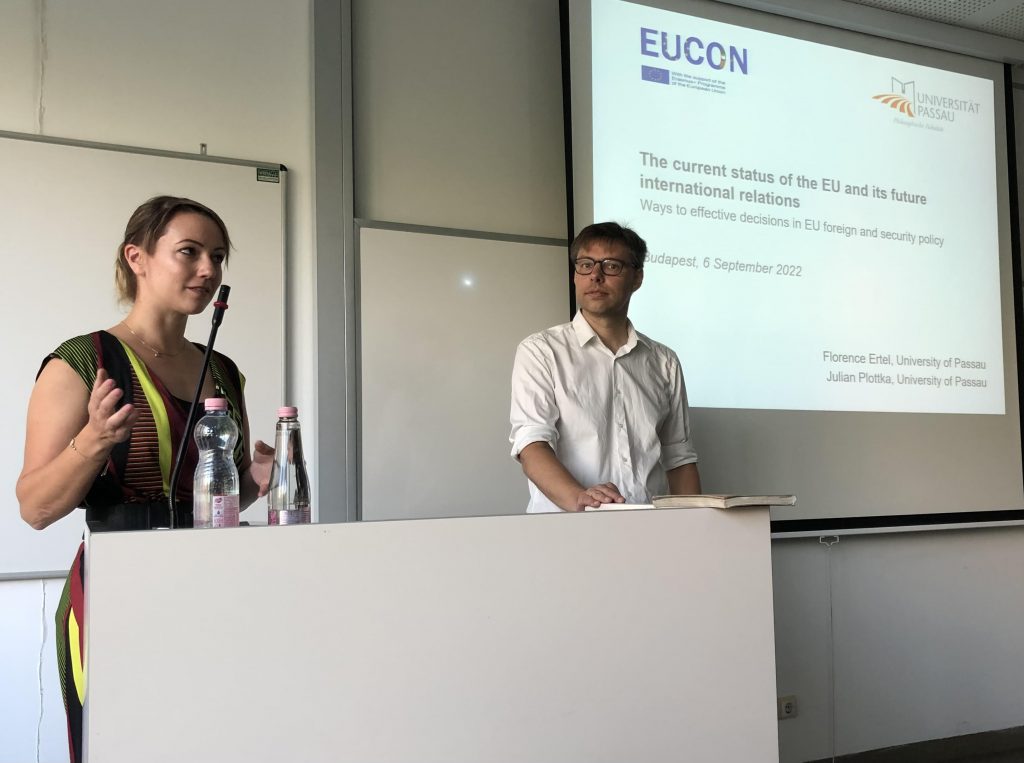Our Eurasia Summer School in Budapest, September 5-9, examined the push and pull factors driving conflict and competition in some areas, convergence and cooperation in others across the vast expanse of Eurasia. Julian Plottka and Florence Reiter noted the surprise, but short-lived, common position of EU member states in reaction to the Russian war against Ukraine. The EU’s ability to act is not guaranteed, due to the intergovernmental nature of the EU’s Foreign and Security Policy (CFSP) and Common Security and Defence Policy (CSDP). The Summer School participants actively joined a discussion about reform options, covering the tendency towards supranationalisation of security policy at the initiative of the European Commission and the abolition of national vetoes in EU foreign policy as recently requested by German Chancellor Scholz.
Susanna Agadjanyan introduced the Eurasian Economic Union (EEU), Russia’s attempt to develop an integration process in some ways mirroring the EU amongst some of the post-Soviet states. From the Armenian perspective, she noted that the country had been on track for closer association with the EU but, following a leadership meeting with Russia, switched in one day to join the EEU. Armenia is an enclave with no customs union borders, remaining highly dependent on Russia.
András Rácz gave a harrowing account of the Ukraine war, outlining how Russia has destroyed Ukraine. If you don’t know things, propaganda fills the void, he noted. He also mused that it is hard to forecast when the other side will make a mistake. Russia has not fully mobilised, yet on the other hand it has real constraints coming as a result of the tough economic sanctions and its own technical deficiencies. For example, he noted how Russia has not taken out Ukraine’s communications infrastructure because its own forced rely on the local mobile phone networks for their own communications. Hannes Meissner and Johannes Leitner noted, from a political risk perspective, Ukraine represented the worst-case risk of conflict, and how international firms that had made the decision to invest in Ukraine planned for such risks in the lead up to the Russian invasion. They noted the subsequent, unprecedented economic warfare against Russia and noted firms were also withdrawing from Russia for reputation risk as well as because of the sanctions
Gábor Csizmazia discussed the Washington perspective on the changing world order and forecast that the US will pursue a two-front confrontation with China and Russia, confident of Russia’s decline. It will pursue hard military and economic power, as well as soft power narratives to win hearts and minds. On China, Tamás Matura argued the competition was not started by the West but by China pushing out European companies, even if not explicitly. In recent times, the EU has become empowered to see China as a systemic rival. David Morris argued over recent decades China’s economic reforms and the Belt and Road Initiative demonstrated a Chinese confidence in the East Asian development model of integration into global value chains, underpinned by a geopolitical strategy to make China the new hub. Ágnes Szunomár presented her research on emerging market investors in Hungary, demonstrating Hungary’s mix of EU location, low labour costs, skills, incentives and low tax has drawn investment from all major East Asian countries, with Korean firms the lead investors. Interestingly, Chinese firms are also drawn by the bilateral political relationship and Chinese diaspora in Hungary and work cooperatively with Taiwanese firms that have also set up in the country.
At the conclusion of the workshop, many of the participating students chose to give presentations on what they had learned over the course of the week and identified fascinating, comprehensive and confronting issues, from the critical importance of how the Ukraine crisis plays out to the questions of the future of China, Japan and other members of what is, again, being seen as a geopolitical battleground of Eurasia.
Also on the final day of the workshop, we combined with a half day conference: Risky Business? China in Hungary, hosted in cooperation with the Central and Eastern European Center for Asia Studies. A separate blog follows.


